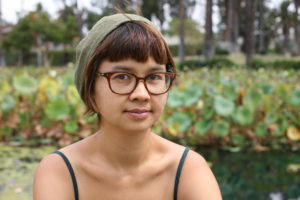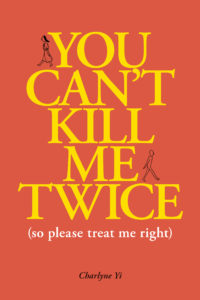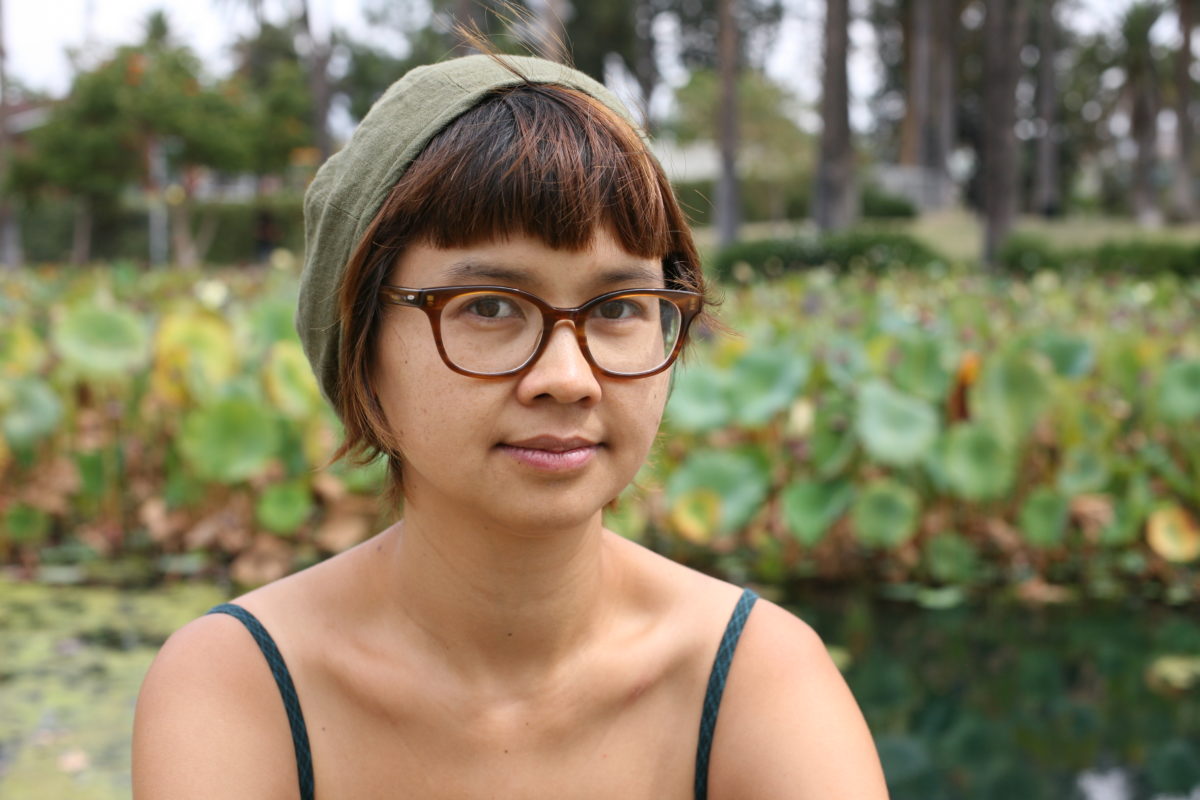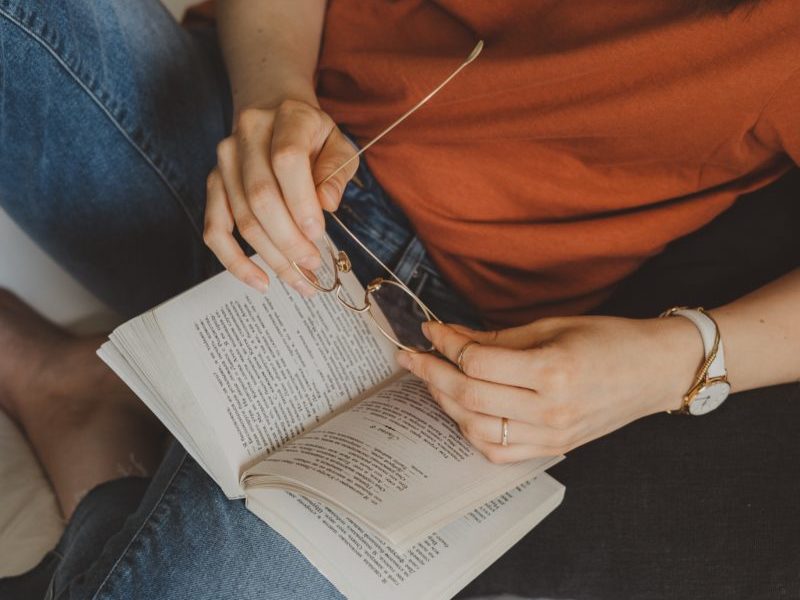Charlyne Yi’s You Can’t Kill Me Twice Explores the “Ecosystem” of Poetry and Relationships
“When words fly, winged and vulnerable / from the depths of their hell, / maybe then you can hear their song, / it’s a tragic but hilarious melody,” poet Charlyne Yi writes in her latest collection, You Can’t Kill Me Twice, published by Andrews McMeel in late November.
This juxtaposition of “tragic but hilarious” acts as a summary for the whole collection, as well as Yi’s larger work as a writer, comedian, artist, and actress. Within her poetry, Yi both embraces and runs from love, thrives in loneliness and yearns for connection, and contemplates the power of vulnerability in a society that often struggles to look below the surface. The push-and-pull of these recognizable forces and common, contradictory feelings makes the collection relatable—so relatable that Yi’s poetry has garnered more than 23 thousand followers on Instagram. Yi shared a glimpse of her writing process, influences, and future goals with Read Poetry.
Read Poetry: Where did the inspiration for You Can’t Kill Me Twice come from, and how did the process of writing it begin?
Charlyne Yi: I usually fill up two notebooks a month. I carry them around and write and draw. It helps me decompress.
Usually, I just let my subconscious go, and then suddenly I’ll have a doodle of a heart in a blouse that’s revealing the heart like breasts. Then my brain says to put some words next to it, like “Too much heart-cleavage was showing.”
Sometimes, writing was me just staring at a typewriter for days, then my roommate would invite me to get groceries. I would go to the market and see a pile of ice bags. Suddenly, I had a poem about how I bought two large ice bags and plopped them into my bed because I missed the cold touch of a man.
RP: The book mixes themes of personal relationships—ex-lovers, estranged fathers, and friends—with more global issues, like racism and climate change. How do these connect for you? Does each impact the other?
CY: Lately, I’ve been thinking about my life as an ecosystem. There’s the micro and macro world, and it seems they both influence each other. If I’m not taking care of me, I can’t have relationships. The more I take care of myself, the more bridges will be built, and the bigger my universe will be.
RP: Your collection also considers what seems to be widespread criticisms of modern society: technology dependence veering on addiction and failures to communicate in real life. How do these topics influence your relationships and your poetry, and how have you tried to reflect upon them in a new way?
CY: I think balance and moderation are difficult. If we’re not mindful about our void we’re trying to fill, whatever we’re using to try to satiate this sadness will shapeshift into different things, whether it be booze, technology, codependency, etc. These topics influence my work because these are subjects I’ve been trying to balance. I’ve gone to support meetings for addiction, tons of therapy, so my thoughts are still the same: boundaries, balance, and healing the void instead of filling it.
RP: There’s also a constant juxtaposition between resisting or fearing love—such as when the speaker dodges a wedding bouquet—and a yearning for it. Where does this tension come from?
CY: One of my favorite writers, Brendon Small, said that people are made of contradictions, like the curmudgeon who hates people but needs people. We’re social animals, and a person who feels resentment has probably been hurt. If they’re likable enough, you want that person to overcome their conflict, reconnect, and grow.
 RP: One of the elements of the book that I most enjoyed was the drawings of different types of lovers (ex: the escapist, the conqueror, the disassemblist). How do you see these archetypes play out in today’s relationships?
RP: One of the elements of the book that I most enjoyed was the drawings of different types of lovers (ex: the escapist, the conqueror, the disassemblist). How do you see these archetypes play out in today’s relationships?
CY: Those are actually examples of any type of relationship: be it a working relationship, friendship, family—not just romance. These archetypes play out in the workplace, social life, and even in our government.
I was sorting out who in my life gave me energy, versus who drained me. For me, healthy relationships are give-and-take. It’s not just “take, take, take,” until you shrivel up into a raisin. It’s like electricity, there’s room for mutual sharing: giving and taking, which provides energy, like how a lightbulb works. The one-sided relationships were the ones where I felt unseen and unheard, like a ghost.
RP: Speaking of those drawings, your art crosses many different fields: visual art, comedy, acting, and, now, poetry, to name a few. Does each influence the other?
CY: A lot of my paintings’ titles tend to be poems.
Some jokes are so sad, they should be called poems.
Some poems are too comedic, certainly, they must be jokes? It’s all a blur.
I’ve been thinking about labels lately. Declaring work to be a poem, versus a joke, is just setting up a platform in which we receive the information. You could tell someone that pizza is a folktale—it actually does have a narrative and does change the character who eats it. It gives the person new energy, the war and harmony inside someone’s stomach that occurs while breaking down the food, and it affects the person’s brain.
RP: You describe yourself as living “on the road.” What effect does this have on your poetry?
CY: I want to live as much as I can while I’m here, which affects my writing. I like meeting people and seeing other realities. My favorite was talking to a man in an antique shop about war and the evolution of weapons and technology. I’m still trying to write a piece about that experience. But so many beautiful, amazing people exist, and I feel very grateful for any lakes, trees, animals, humans, and worlds that welcome me.
RP: What’s your best advice for poets?
CY: Melt a marshmallow peep in the microwave, chuck it to your ceiling, and try to catch it in your mouth.
RP: What’s next for you creatively?
CY: Wrestling training.
You can buy Charlyne Yi’s You Can’t Kill Me Twice here.


